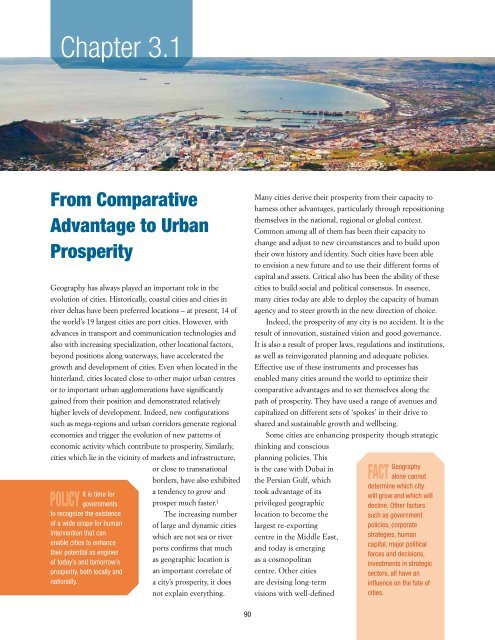STATE OF THE WORLD'S CITIES 2012/2013 Prosperity
STATE OF THE WORLD'S CITIES 2012/2013 Prosperity
STATE OF THE WORLD'S CITIES 2012/2013 Prosperity
You also want an ePaper? Increase the reach of your titles
YUMPU automatically turns print PDFs into web optimized ePapers that Google loves.
Chapter 3.1<br />
From Comparative<br />
Advantage to Urban<br />
<strong>Prosperity</strong><br />
Geography has always played an important role in the<br />
evolution of cities. Historically, coastal cities and cities in<br />
river deltas have been preferred locations – at present, 14 of<br />
the world’s 19 largest cities are port cities. However, with<br />
advances in transport and communication technologies and<br />
also with increasing specialization, other locational factors,<br />
beyond positions along waterways, have accelerated the<br />
growth and development of cities. Even when located in the<br />
hinterland, cities located close to other major urban centres<br />
or to important urban agglomerations have significantly<br />
gained from their position and demonstrated relatively<br />
higher levels of development. Indeed, new configurations<br />
such as mega-regions and urban corridors generate regional<br />
economies and trigger the evolution of new patterns of<br />
economic activity which contribute to prosperity. Similarly,<br />
cities which lie in the vicinity of markets and infrastructure,<br />
or close to transnational<br />
borders, have also exhibited<br />
a tendency to grow and<br />
prosper much faster. 1<br />
It is time for<br />
POLICy governments<br />
to recognize the existence<br />
The increasing number<br />
of a wide scope for human of large and dynamic cities<br />
intervention that can<br />
which are not sea or river<br />
enable cities to enhance<br />
ports confirms that much<br />
their potential as engines<br />
of today’s and tomorrow’s as geographic location is<br />
prosperity, both locally and an important correlate of<br />
nationally.<br />
a city’s prosperity, it does<br />
not explain everything.<br />
90<br />
Many cities derive their prosperity from their capacity to<br />
harness other advantages, particularly through repositioning<br />
themselves in the national, regional or global context.<br />
Common among all of them has been their capacity to<br />
change and adjust to new circumstances and to build upon<br />
their own history and identity. Such cities have been able<br />
to envision a new future and to use their different forms of<br />
capital and assets. Critical also has been the ability of these<br />
cities to build social and political consensus. In essence,<br />
many cities today are able to deploy the capacity of human<br />
agency and to steer growth in the new direction of choice.<br />
Indeed, the prosperity of any city is no accident. It is the<br />
result of innovation, sustained vision and good governance.<br />
It is also a result of proper laws, regulations and institutions,<br />
as well as reinvigorated planning and adequate policies.<br />
Effective use of these instruments and processes has<br />
enabled many cities around the world to optimize their<br />
comparative advantages and to set themselves along the<br />
path of prosperity. They have used a range of avenues and<br />
capitalized on different sets of ‘spokes’ in their drive to<br />
shared and sustainable growth and wellbeing.<br />
Some cities are enhancing prosperity though strategic<br />
thinking and conscious<br />
planning policies. This<br />
is the case with Dubai in FACT the Persian Gulf, which<br />
took advantage of its<br />
privileged geographic<br />
location to become the<br />
largest re-exporting<br />
centre in the Middle East,<br />
and today is emerging<br />
as a cosmopolitan<br />
centre. Other cities<br />
are devising long-term<br />
visions with well-defined<br />
Geography<br />
alone cannot<br />
determine which city<br />
will grow and which will<br />
decline. Other factors<br />
such as government<br />
policies, corporate<br />
strategies, human<br />
capital, major political<br />
forces and decisions,<br />
investments in strategic<br />
sectors, all have an<br />
influence on the fate of<br />
cities.















![1 statement by dr.[mrs] kakoli ghosh dastidar - Member States Portal](https://img.yumpu.com/27526598/1/190x245/1-statement-by-drmrs-kakoli-ghosh-dastidar-member-states-portal.jpg?quality=85)

